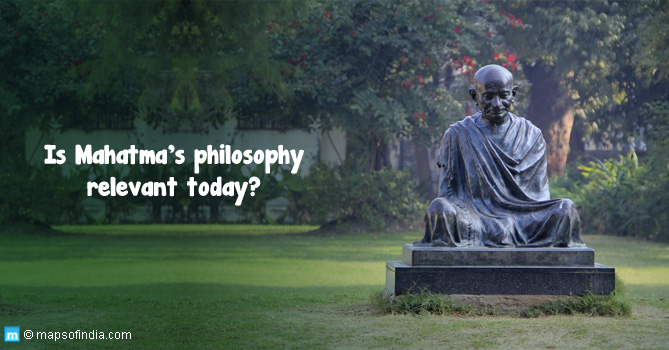Known as the founding father of India, Mahatma Gandhi left us with a legacy of pre-Independence struggle that we all can cherish and one that still serves as an inspiration for so many people across the country. His unwavering focus on truth, simplicity, caring for needy, and non-violence are ones that have the potential to keep one grounded and on a proper path for the rest of his or her life. Not only that, the Father of the Nation has left his indelible mark on developmental issues as well.
Non-Violence and Peace
This is an era when majority of the countries around the world are spending most of their earnings on defence, adding to their nuclear arsenal. The situation is especially dire in the third world countries, which used to be colonies before. As a result of years of colonial rule, they have faced wanton exploitation and their resources have been reduced to smithereens. However, following their emancipation from the colonial yolk, they have not focused their energies on getting things back on track. Their sole focus has been on keeping things safe and this has hampered key areas like education, health, and the overall economy in these countries.
As a leader, Mahatma Gandhi believed in dictum of peaceful and non-violent protests. This was borne out in popular movements like Satyagraha and Non-Cooperation, where people did not flinch even in the face of continued and repressive British onslaught. Jawaharlal Nehru, a follower of Gandhi and the first Prime Minister of India, followed this dictum as well by starting the Non-Alignment Movement that allowed India to steer clear of the Cold War. As has been already said, now there is a need around the world to focus on key areas like health, education and economic development along with safety. A balance needs to be there.
Upliftment of Depressed Classes
One of the many dark spots in India’s history has been its dreaded caste system. What started out in the Early Vedic Age as an occupation-oriented system became a rigid system that could not be altered under any circumstances. Soon, qualities were being defined in terms of one’s caste affiliations and people were either being privileged or ostracised on the basis of the same. This continued in the colonial era in the form of social evils like manual scavenging and still lingers now in the form of ills and heinous acts of crime such as honour killing.
Mahatma Gandhi was one of the first leaders to have spoken out against the general discrimination meted out to the people of lower castes. He called them Harijan or children of god. He wished that these hapless and depressed people be accepted and welcomed into the mainstream society. As has been already said, caste system is a malaise that penetrates deep into Indian society. Marriages, levels of social interaction and jobs depend on one’s caste. Some steps have been taken in terms of reservation, but one feels that more needs to be done.
Gandhian Socialism
From an economic point of view, Gandhi dreamed of a vibrant nation with the village at its economic base. However, ever since Independence, India has walked a different path of development. It all started with a focus on industrial development through the manufacturing and mining industries till the 1990s to be followed by the IT and tech boom of the 2000s and thereafter, that brought to the forefront the service sector. All these have ensured that India is now regarded as a global economic power in the waiting but agriculture, the largest sector in terms of employment generated, continues to languish.
Modern day economists opine that a village needs to become a city in order to progress. What they do not realise that we all have our ways of life and from an environmental perspective, villages and forests are the lungs of the world. If the whole world becomes as they wish it to be, then many people would not be able to live the same way that they do. Just imagine if we have to relocate to villages and practise agriculture! Or, imagine concrete jungles all around the world without many trees and animals only in zoos! This is why it is important to achieve a semblance of balance between progress and tradition. India, with its unbridled natural resources and well-established agricultural setup, could have attained the sort of self-sufficiency that most countries can only dream of. However, such a possibility never materialised.
Anti-Apartheid Movement
This is an issue that has global ramifications. Not many might know but it was this small Indian lawyer who changed the way life unfolded in South Africa. After he was kicked out of a whites-only train compartment in Pietermaritzburg, Gandhi decided to fight against the rampant racism in South Africa and started a movement against racial discrimination on the lines of peaceful and non-violent protest, something that he would emulate successfully in India as well. This movement provided impetus to the likes of Nelson Mandela to carry on the fight against South African Government and finally led to the country’s emancipation from the dreaded regime in 1991 with greater rights and privileges restored to the indigenous Africans, the colored, and the Asian population.
This principle of standing up against racial discrimination also found some resonance in the US where Martin Luther King Jr. fought for equal rights for people of African origin till his tragic death. It has global significance in the way that the modern world is still not free of racism and people are still being oppressed on various grounds related to race, religion, etc. The world is not a safe place to live and perhaps the world needs to feel what Mahatma Gandhi had felt all those years back – that all people in the world are inherently equal and nobody should be discriminated for or against on the basis of religion.
Conclusion
It is common knowledge that the great men before us have shown us the right path to progress and make our lives a better one. Yet, we humans, in all our pomp, glory, and disdain for the past choose to ignore the lessons of past. We all know what Gandhi had said and we all know their benefits. Yet, we never implement them fully. Perhaps, we do not realise we would be benefitted if we did.
Know more facts on our Bapu:
Mahadev Desai: More than the Mahatma’s shadow
Some lesser known facts about Mahatma Gandhi
Are Mahatma Gandhi’s Ideals Relevant Even Today?
What was the Gandhi-Irwin Pact?
Essay on Mahatma Gandhi For Students and Teachers
Read Biography of Mahatma Gandhi
Nathuram Godse and Assassination of Mahatma Gandhi





